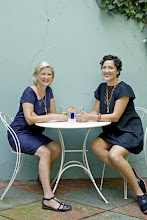
I cannot tell you how many times I've received or overheard requests from companies or customers looking for a step-by-step guide to Sustainability.
Unfortunately, though, "We" cannot give you a universal, detailed manual for Sustainability—and here are some reasons why:
1) Sustainability is more than an organic certification or a third party fair labor certification. It's a way of thinking. It's continuously asking, is this action, material, process etc. sustainable for everyone including mother earth?
2) "We" are still figuring it out. Give us a second. This revolution involves a lot of people, a lot of materials, a lot of products, a lot of grey areas. Problem solving and finding real solutions takes time. Time to test and time to refine.
3) Not everything can, needs to or will be certified organic. For example, alpaca. My friend Tamara owns a knitwear company Kusikuy.
KUSIKUY alpaca fleece is sourced from free range alpacas that graze in small herds on the natural native grasses of Bolivia's Andes Mountains. They are cared for humanely, allowed to roam freely up mountainsides and then gently led back to family farms where they are corralled and tended to for a short period of time before being left to wander free again. Alpacas are valuable because they produce fine quality fiber throughout their entire life. They are deeply honored in the Andean tradition.Nothing Kusikuy produces is certified organic. But is Kusikuy's Alpaca any less sustainable than, say, organic cotton? Cotton production requires large amounts of water (often irrigated), lots of washing and drying and is often made into disposable tee shirts?
4) Sustianability is not one size fits all. What works for Wal-mart may not work for a small to medium American fashion designer.
Instead of a manual, you have to continuously be a detective/student and bust out your own moral compass.
For the record, I'm not saying that there aren't a good number of cool/reliable/helpful organizations already doing really great stuff to promote sustainability. Take Transfair, which sets standards for fair trade and labor, or Oeko-Tex, a leader in textile certification. Both are great partners and have great tools for companies striving to achieve social and environmental sustainability.
I am especially excited for Source4Style (in BETA) a,
(B2B) online marketplace that allows designers and retail sourcing specialists to search, compare and purchase more sustainable materials from a growing network of global suppliers.Summer Rayne Oakes, a co-founder, is the first tell you they are not claiming to be the "moral authority", they are simply a vehicle to provide transparency along the supply chain so you can make your own educated decisions.


No comments:
Post a Comment